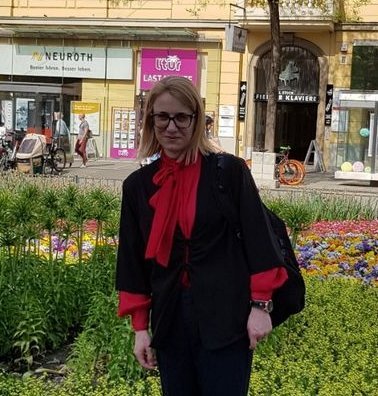Marjana Vaneva, Macedonia

- Current position: Dean of the School of Foreign Languages, University American College Skopje, Skopje, R. Macedonia
- Scholarship: CEEPUS freemover teacher mobility to the University of Graz
- Duration: 23.04.2018 – 29.04.2018
Curriculum Vitae
Marjana Vaneva is an Associate Professor of Linguistics at the University American College Skopje. She teaches at the university’s School of Foreign Languages, having students from both, undergraduate and postgraduate, cycles. Her teaching interests are Linguistics and Linguistics-related courses, thus she lectures on Introduction to Linguistics, Contrastive Analysis, Translation, Syntax, Semantics, Cognitive Linguistics, but also Business English, Educational Management and ELT Methods. Her research interest is on the boundary among Lexicology, Morphology, Syntax and Semantics, and mostly in the area of Cognitive Linguistics, that is, how words from different lexical (sub)categories are formed and used in the language, and then how they are understood by learners, non-native speakers of English. The idea is to see if non-native speakers of English understand the process of zero derivation as it is formed and used by native British English speakers. This is to investigate, or better, reconsider, if cognition definitely lies behind this word formation process, and adds to faster, more economical communication, when non-native speakers of English are given to use English cognitively zero derived lexemes. The other research idea that Prof Vaneva has lately been working on is how negation in English is expressed by native and non-native speakers of the English language. To explore this, she compares the way English negation is expressed by native English speakers, students at a British university, on one hand; and the way English negation is formed and used by non-natives, students at a Macedonian university. Semantics is the core of both types of research, combined with the lexicological, morphological and syntactic aspects. Marjana Vaneva is a member of international associations that mainly deal with linguistics and teaching, and has presented at international conferences in the country and abroad, having published papers from her study and research area in international, well-ranked journals. Along with her Dean’s and professor’s work, she is a reviewer and editor for linguistics papers and journals, mentor to students’ Bachelor, Specialist and Mentor’s theses, proofreader, as well as (external) review committee member for colleagues’ scientific appointments.
Reflection
At the University of Graz, Austria, and, as a freemover, it was the Department of Slavic Studies that I visited, where I gave lectures to the Linguistics students who studied Bosnian/Croatian/Serbian. During my week-long stay, I had three lectures at this university; two were from the area of the Macedonian language – the area that was the matching point between my host and home institutions, and one was about English, from the area I had been and am still working on. The topics from Macedonian were: ‘Simple and Complex Verb Forms in Macedonian’ and ‘Macedonian Language and Culture: An Introduction’, in which, as a linguist with a native Macedonian, I acquainted the students at this university (mainly Austrians, but other foreigners too, who study Slavic languages) with the Macedonian language, its structure, and the culture of my home country. None of the students spoke this language, thus, the lectures offered completely new material to them, but due to the similarity of their study languages to Macedonian, and the interest, participation and interaction of their Linguistics professors during the class, they could easily make links between this and the Slavic languages they were studying. The lecture on my current work was ‘Saying ‘No’ in English: The Macedonians and Their Negation’, when productive discussion on Linguistics was open, comparing my findings with the situation in other languages, regarding this same process – how the other people express negation in English and, in doing so, discuss if they are influenced by English or by their native language. As for the experience I had at the university and during the stay overall, I would like to thank the university, the CEEPUS coordinator and the Linguistics colleagues who welcomed me, had me as a guest lecturer in their regular classes, and for the nice and friendly atmosphere created in our mutual communication. It would be of mutual interest if our two universities could collaborate in (other) mobility projects, so that students and staff would be exchanged, but also, as discussed with them, if collaboration on Austrian-Macedonian projects can be started to the benefit to the students’ learning, the professors’ research profiles, the universities, and, ultimately, to the countries in question. Therefore, I would really like to see the colleagues from the University of Graz as guest lecturers at my home institution soon, and wish for them to feel the same advantages I have felt – pleasant stay, productive classes, constructive discussions, all of which make my experience beyond positive. And, last but certainly not least, I would like to thank the Austrian Agency for International Cooperation in Education and Research (OeAD-GmbH) for granting me the mobility award to stay and teach at the university I selected as an institution that would add to my personal and professional development – the University of Graz. I hope this teaching assignment and short research stay of mine would mark the beginning of the professional collaboration between the University American College Skopje, R. Macedonia, and the University of Graz, Austria.
